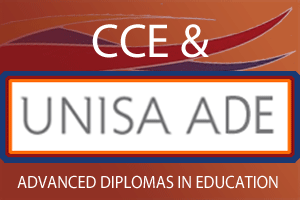ARCHIVE: This material is no longer maintained and should be viewed for reference only

The UNISA ADE project is a joint teacher education project between UNISA (University of south Africa) and the Centre for Commonwealth Education (CCE) in the Faculty of Education. Sara Hennessy, Bjoern Hassler and Professor Maurice Galton from CCE are collaborating with various UNISA ADE teams led by Professor Callie Loubser on the Development of 'Advanced Diplomas in Education' in mathematics, science, ICT integration within education and inclusive education.
Background
The provision of school-based professional development opportunities for practising teachers responds to the Millennium Development Goal of Universal Primary Education. While the number of students formally enrolled in primary education is increasing, there are significant challenges in ensuring even the most basic quality of education: in many sub-Saharan African countries basic literacy and numeracy rates after six years of schooling are low. Considering the numbers of qualified teachers, a significant restructuring o teacher education will be needed to meet the targets, and school-based professional development of poorly qualified or unqualified teachers has a key role to play.
"Advanced Diplomas in Education" (ADEs) are a new qualification in the South African national qualifications framework that was introduced as part of a comprehensive national review of minimum requirements for teacher education in South Africa. The ADEs place increased emphasis on the teacher's role as a knowledge worker encompassing disciplinary, pedagogic, fundamental and contextual learning. They are targeted at teachers who wish to deepen their understanding of the teaching of particular subjects in particular phases.
Unisa staff face a twofold challenge in constructing these ADEs. First the subject knowledge of teachers is often inadequate, and modules thus need to contain some instructional material designed to improve the teachers' subject matter knowledge: Unless classroom practitioners are confident in their understanding of the subject matter they will be dis-inclined to adopt new teaching approaches. The second challenge concerns the conditions faced in the many rural and suburban schools where classes are very large by Western standards so that aspects of effective pedagogy, which call for increased teacher-student discourse and more student-student cooperation, need to be implemented in appropriate ways.
Project activities through 2012 culminated in a week-long workshop (February 2013) at Unisa in Pretoria, during which the above challenges were debated and various solutions considered. Two pilot modules emerged from this process (mathematics & science) and have become templates for further units. During 2013 Unisa staff have worked at extending the number of modules and collecting necessary materials (video and audio clips, photographic images) which will be used for illustrative purposes.
Another week-long workshop in Cambridge (June 2013) [with thanks to the Cambridge-Africa Alborada Research Fund for making this possible] brought all the team members together and provided the opportunity to evaluate and refine the existing modules, develop new ones and instruct staff in the technical aspects of incorporating the additional materials into the modules. During the workshop, the Cambridge team were able to draw on expertise from other faculty members in the other areas.
Future Aims
A further workshop will take place in Pretoria in March 2014.
The new ADEs will be launched in 2014/15 and CCE/UNISA plan to continue their collaboration into a research/evaluation phase.
Open Educational Resources
To contribute to addressing educational challenges across sub-Saharan Africa, all ADE materials developed will be made available as Open Educational Resources, facilitating world-wide re-use without copyright restrictions, and ensuring effective use of financial and other resources.
